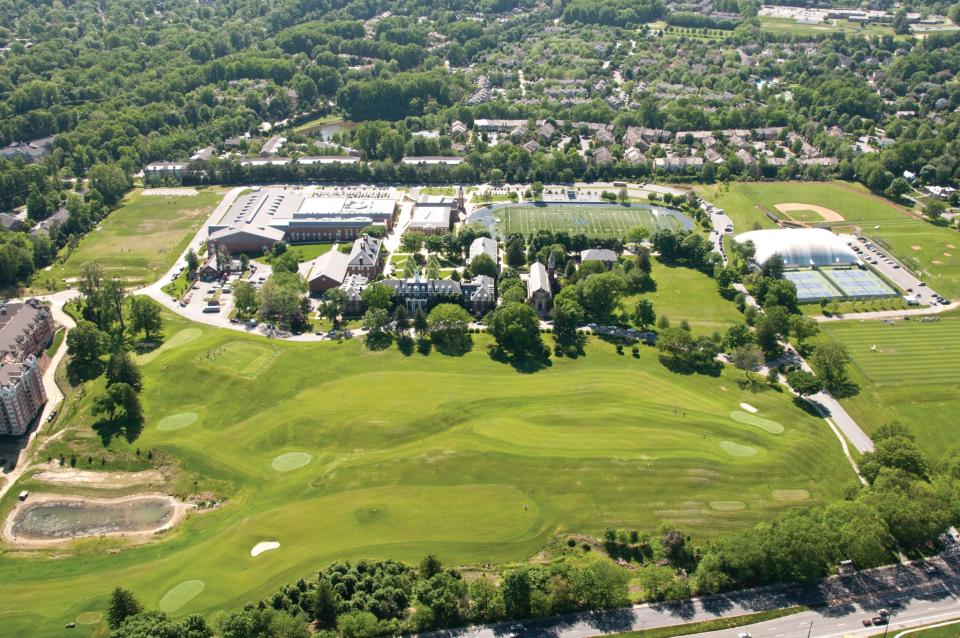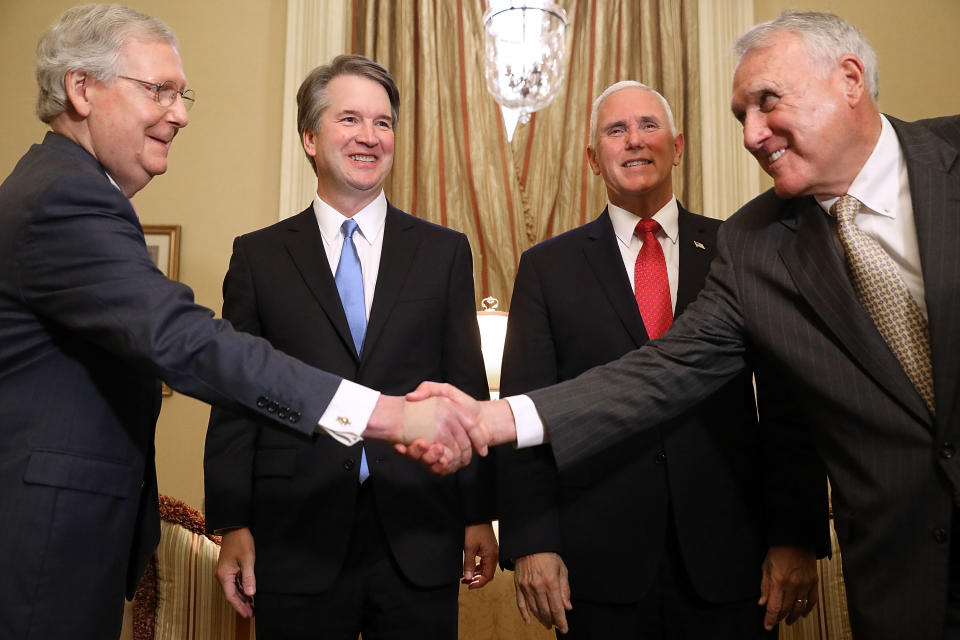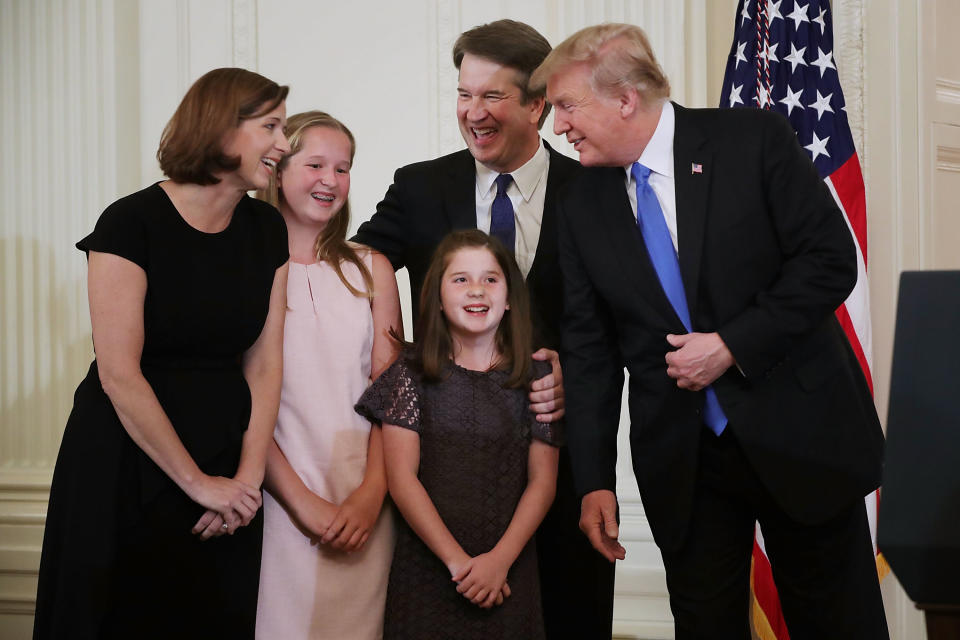How Brett Kavanaugh’s religious upbringing shaped his thinking

When President Trump nominated Brett Kavanaugh to the Supreme Court on Monday night, journalists logically began scouring his judicial decisions and education at Yale Law School to glean insights into how he might rule if confirmed. But for an understanding of his overall worldview, beyond jurisprudence, one has to go back much further — to his religious upbringing in the suburbs of Washington, D.C.
Kavanaugh, 53, was born in the nation’s capital and grew up as an only child in nearby Bethesda, Md., which is among the most educated and affluent towns in the United States. He attended Mater Dei school for boys, which provides “an accelerated yet basic Catholic education in which character development is emphasized and appreciated as much as academic accomplishments” for grades one through eight. He then moved on to high school at Georgetown Preparatory, the only Jesuit boarding school in the U.S. Both schools had a profound effect on the man Kavanaugh became.
“The motto of my Jesuit high school was ‘men for others.’ I’ve tried to live that creed,” Kavanaugh said at Monday’s ceremony unveiling his nomination to the high court. “I’ve spent my career in public service — from the executive branch and the White House to the Court of Appeals for the D.C. Circuit. I’ve served with 17 other judges, each of them a colleague and a friend.”
Kavanaugh described himself as part of Washington’s vibrant Catholic community, whose members, he noted, may disagree about many things but are united by a commitment to serve.
William G. McMurtrie, now headmaster of Mater Dei, remembers Kavanaugh from their time attending the school, where the day began with a Catholic religion class.

“In the seventh grade every year, we award the highest honor of Mater Dei,” McMurtrie told Yahoo News. “It’s called the Headmaster’s Award, and it’s given to one student who best exemplifies the school’s philosophy of work hard, play hard, but most importantly, be a good guy. And Brett won that award. He won it not just because he was without question the best student in his class — because the award isn’t necessarily based on academics — but on his character.”
With this award, the faculty was recognizing something special in Kavanaugh. He was deemed to be the hardest worker; he made a positive impact, had an active concern for others, respected adults and peers, and demonstrated good sportsmanship, according to McMurtrie.
“His marks in those more important areas were always exemplary,” McMurtrie said. “His teachers — many of them who’re still around, and one’s still working at Mater Dei — will tell you he was not only the brightest student in that class but also the kindest and most well-rounded.”
Monsignor John Enzler, president and CEO of Catholic Charities of the Archdiocese of Washington, has known Kavanaugh for 40 years. They met when Kavanaugh was his altar boy at Little Flower Church in Bethesda. They would also see each other at masses at Mater Dei, where Enzler was a chaplain. Years later, he was a witness at Kavanaugh’s marriage to Ashley Estes.
“At Georgetown Prep, you saw him catch the spirit of their theme, which is ‘be a man for others,’” Enzler told Yahoo News. “Jesuit schools are about giving back. I saw his willingness to try to give back and do things for other people. … He really got the DNA of giving, sharing and faith.”
Enzler said there’s a strong belief in living according to God’s values at the Catholic schools Kavanaugh attended. They emphasize justice, fairness, helping those in need, watching over the poor, giving back to others and being a consistent person of goodness.

“Those are things they instill,” Enzler said. “Then you watch people and see them trying to live those values. For many people, they take hold and become the values of their life.”
Enzler was in his 30s when Kavanaugh was a teenager. He said that in many ways Kavanaugh and his friends were just regular teenagers — loud, funny, tongue-in-cheek — but that they were also active with service projects starting around confirmation. He said Kavanaugh never fell into a bad crowd and lived out Jesuit values, even on weekends.
“You know, teenage parties can be a little wild, a little crazy, but I don’t remember seeing much of that from the kids,” Enzler said. “These were not kids going out and getting drunk or using drugs. They were already living the values when they had very little adult supervision. They just knew who they were.”
Georgetown Prep history teacher Stephen Ochs said Kavanaugh had an intense interest in government, politics and history as a teenager.
“He was someone who through his actions earned the respect of people,” Ochs said. “He would enter the moment he was in. So if he’s playing football, he’s in that moment. If he’s in class, he’s in that moment. If he’s in the chapel, he’s in that moment.”
He was also a fierce competitor — he was captain of the basketball team and played football, despite being on the smaller side — but never reached for the spotlight, according to Ochs.
“I’m sure the most painful part of the confirmation process for him was giving that speech and having to talk about himself,” Ochs said. “He’s really a humble guy. I think his humility is reflected in his judicial temperament. It’s the legislature that makes the law; judges apply them. If they don’t like something, that’s irrelevant. They have to abide by the law.”
In the early 1980s, Ochs divided his students into defense and prosecution teams for a mock trial about President Harry Truman’s decision to drop atomic bombs on Japan. More than any other student in his class, Kavanaugh’s performance made an impression.

“Well, he poured into that,” Ochs said. “He studied both sides. He had the arguments down. He had the counterarguments ready. When he did it, he was really amazing to watch in the classroom — that stands out in my mind.”
Kavanaugh seems to have taken that work ethic to heart, but he has also taken his own side in an ongoing debate over the application of law. The nominee has described his judicial philosophy as “straightforward” and said a judge must be independent and interpret — not make — the law, and interpret statutes and the Constitution as written, informed by tradition and precedent.
Applying his Jesuit training
Kavanaugh’s judicial philosophy is also clearly informed by his faith. Jesuits are members of the Society of Jesus, a scholarly order of more than 16,000 Catholic priests and brothers dedicated to the “greater glory of God” and the good of all humanity. They’re renowned for the intellectual rigor of their scholarship and well-known for their social justice outreach. Pope Francis is the first Jesuit pope.
Father Tom Gaunt, a Jesuit of the Maryland Province and executive director at Georgetown University’s Center for Applied Research in the Apostolate, said Jesuit high schools like Georgetown Prep provide a strong grounding in the liberal arts as well as an intellectual focus on understanding one’s faith and acting on it.
“There’s the Jesuit theme about the care of the person, which becomes translated as ‘There’s not an anonymous mass here. There’s always a living a breathing person standing in front of you who either benefits or suffers from the consequences of your choices and actions,’” Gaunt told Yahoo News. “As a young man at the school, that would’ve been brought up to him and he would have reflected on that again and again.”
Enzler said Kavanaugh caught “a little bit more of the Jesuit spirit” and its accompanying intellectual gifts.
“His Jesuit education plus Yale College plus Yale Law School — he’s a very smart and intellectually gifted guy — puts you in a place where you can really study the Constitution and make decisions that are in line with what this country needs,” Enzler said.
Everyone interviewed for this story agreed that Kavanaugh’s parents raised him to be socially conscious of those who are less fortunate. Before she entered law, his mother, Martha Kavanaugh, was a history teacher at predominantly African-American public high schools in Washington, D.C. Kavanaugh said her example taught him the importance of equality for all Americans.

Kavanaugh regularly volunteers with the John Carroll Society, an organization of Catholic professionals, and with Catholic Charities, serving meals to the homeless. Despite his heavy workload, Enzler said, the judge is almost always there on the street serving meatloaf, mashed potatoes, pasta and other dishes.
“That helps Catholic Charities tremendously,” Enzler said. “It gives an example to others that a busy guy like Brett’s doing it. It also speaks to what we’re all called to do, which is take care of those who are poor and in need.”
Kavanaugh is also a lector at his parish in Washington, The Shrine of the Most Blessed Sacrament, where he has coached his daughters’ basketball teams for the past seven years.
The abortion issue
Without question, the fate of Roe v. Wade, which affirmed a woman’s right to abortion, was the most talked about variable when Associate Justice Anthony Kennedy announced his retirement from the high court. The Catholic Church’s formal hierarchy opposes abortion, but the opinions of Catholic laity in the U.S. more closely resemble those of the American public in general.
Kavanaugh’s nomination elicited fear from abortion rights groups and optimism in anti-abortion circles. Though his background would suggest that he is opposed to abortion, Kavanaugh said during his confirmation hearing for the D.C. appellate court in 2006 that he would follow court precedent.
“If confirmed to the D.C. Circuit, I would follow Roe v. Wade faithfully and fully,” Kavanaugh said. “That would be binding precedent of the Court. It’s been decided by the Supreme Court. It’s been reaffirmed many times.”
Sen. Dianne Feinstein, D-Calif., angered many Catholics last year during judge Amy Coney Barrett’s confirmation hearing for an appelate court position. Feinstein was accused of implying that Barrett’s Catholic beliefs could interfere with her ability to determine the law.
“When you read your speeches, the conclusion one draws is that the dogma lives loudly within you, and that’s of concern,” Feinstein told Barrett.

“The dogma lives loudly within me” became a slogan for proud Catholics who feel judged and condescended to by mainstream society.
Gaunt said that every person experiences and judges the world within some moral framework, which is more often than not shaped by our religious perspectives and experiences.
“No one is looking at the world and these experiences as a blank slate,” Gaunt told Yahoo News. “Do we acknowledge what that moral framework is? We deceive ourselves if we think we don’t have one.
“That’s what we expect of public servants: that they know what their moral framework and how this interacts with our civil society,” Gaunt added. “Intelligent, reflective men and women will make discerning choices, but we’re all framed by those different moral and religious values.”
The No Religious Test Clause of the U.S. Constitution affirms that no one needs to accept a particular religion in order to hold federal office or a government job.
The Supreme Court had been dominated by Protestants throughout most of its history, but today most of its members are Catholic and Jewish. Kavanaugh was nominated to fill the vacancy left by Kennedy, also a Catholic, so his confirmation would not change the religious makeup of the court. It currently comprises three Jewish and six Catholic justices — if one counts Trump’s previous SCOTUS pick, Neil Gorsuch, who was raised Catholic but now attends an Episcopal church. Gorsuch also attended Georgetown Prep and was just two years behind Kavanaugh.
“Both these guys have a sense of a calling and mission, and that what they’re doing is part of this huge picture of how God works in the world,” Ochs said. “Their part of the world is the law. I think they take that very seriously without taking themselves too seriously. I think that comes from the faith that was developed early on.”
—————
More Yahoo News stories on the Supreme Court:



